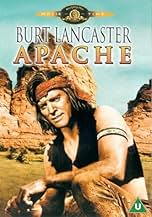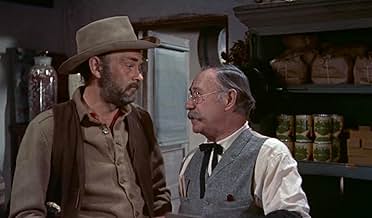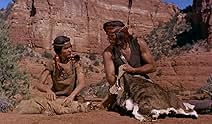IMDb रेटिंग
6.3/10
5.3 हज़ार
आपकी रेटिंग
अपनी भाषा में प्लॉट जोड़ेंRefusing to let himself be re-settled on a Florida reservation, Massai, an Apache warrior, escapes his captors and returns to his homeland to become a peaceful farmer.Refusing to let himself be re-settled on a Florida reservation, Massai, an Apache warrior, escapes his captors and returns to his homeland to become a peaceful farmer.Refusing to let himself be re-settled on a Florida reservation, Massai, an Apache warrior, escapes his captors and returns to his homeland to become a peaceful farmer.
Charles Bronson
- Hondo
- (as Charles Buchinsky)
Dehl Berti
- Cherokee Householder
- (बिना क्रेडिट के)
Paul E. Burns
- General Store Proprietor
- (बिना क्रेडिट के)
Lonnie Burr
- Indian Boy
- (बिना क्रेडिट के)
Jerado Decordovier
- Apache
- (बिना क्रेडिट के)
John George
- Shoeshine Man
- (बिना क्रेडिट के)
Anne Kunde
- Townswoman Leaving Trading Post
- (बिना क्रेडिट के)
Rory Mallinson
- Citizen Noticing Handcuffs
- (बिना क्रेडिट के)
Mort Mills
- Sergeant of the Guard Fort.
- (बिना क्रेडिट के)
फ़ीचर्ड समीक्षाएं
Apache is one of the first Hollywood films which dealt in a serious, thought-provoking and openly sympathetic way with the suffering of the native Americans as a consequence of the white man's expansion to the West. It is interesting to watch this film side by side with, for instance, John Ford's silent classic The Iron Horse, as we can see two opposite approaches to the history of the American West in the late 19th century. While Ford's epic production is a hymn to white man's progress and to the expansion of civilization to the wild, unexplored territories of the United States inhabited by the Indian nations, Apache is a touching drama about the desperate fight for survival of those same Indians, who were ruthlessly driven out of their ancestral lands and ways of life by the stern advance of material progress. The plight of the Apache nation is embodied by the central character of the film, the strong, stubborn, freedom-loving and nobly human Indian warrior Massai, played by the actor Burt Lancaster, who was also the inspirer and producer of the film. Unwilling to accept personal slavery and what he deems as the total humiliation of his nation after Chief Geronimo's surrender to the U.S. Army and the confinement of the Apache tribes to the reserve, Massai decides to start a one-man fight for human dignity and freedom and becomes a solitary outlaw at war with the local U.S. Army garrison.
The film is certainly worth watching, not only because of the human interest of the story itself, but also as a well-crafted piece of cinema. Apache is the first great movie by the director Robert Aldrich, who in that year of 1954 would score double and reward us with another masterpiece, the unforgettable Veracruz, also with a Burt Lancaster in absolute state of grace as an actor, this time teaming with the veteran Gary Cooper.If in Veracruz Lancaster gave as a memorable performance as the attractive villain Joe Erin, here he is no less powerful as the honest and indomitable warrior Massai. At his side, also good performances by Jean Peters in the role of the faithful, ever-loving and determined squaw Nalinle, and John McIntire as the hard-boiled, cynical Indian-hunter Al Sieber, in a role that prefigures the twilight heroes of Peckinpah's films.
All in all, a classic of the Western genre which inaugurated Aldrich's later shining career.
The film is certainly worth watching, not only because of the human interest of the story itself, but also as a well-crafted piece of cinema. Apache is the first great movie by the director Robert Aldrich, who in that year of 1954 would score double and reward us with another masterpiece, the unforgettable Veracruz, also with a Burt Lancaster in absolute state of grace as an actor, this time teaming with the veteran Gary Cooper.If in Veracruz Lancaster gave as a memorable performance as the attractive villain Joe Erin, here he is no less powerful as the honest and indomitable warrior Massai. At his side, also good performances by Jean Peters in the role of the faithful, ever-loving and determined squaw Nalinle, and John McIntire as the hard-boiled, cynical Indian-hunter Al Sieber, in a role that prefigures the twilight heroes of Peckinpah's films.
All in all, a classic of the Western genre which inaugurated Aldrich's later shining career.
Apache was the third feature Robert Aldrich directed. Before he worked as an assistant director to Jean Renoir, William Wellman, Lewis Milestone and even Charlie Chaplin and also made several episodes for TV films. He was invited to direct Apache by its co-producer and main star Burt Lancaster.
The Apache's particularity is that it doesn't enter the classic Western scheme of almost obligatory showing of the Indians as bad guys, thou the most illustrious example of this probably belong to John Ford's 1964 Cheyenne Autumn with which the legendary director bid a farewell to the genre. Also Apache's distinctiveness resides in the treatment that is given to the central theme of the Western genre, which is revenge.
Here the Indian rebellious warrior Massai, wonderfully played by Burt Lancaster is obsessively seeking revenge facing the enemy not only in a form of one person or a small group of people in accordance with traditional Western vengeance system, but in a form an entire society either Indian or White, a society that he considers his enemy and against which he courageously fights alone not looking for help from anyone till he meets an equally strong character Nalinle (Jean Peters), a woman who simply accepts him as he is ready to share all the difficulties of Massai's life and even to sacrifice her own life for the man she loves. From this point on as his affection for Nalinle increases, his desire to fight everything and everyone proportionally decreases resulting in his settling down looking for more peaceful existence, which is hardly possible due to the burden of his past deeds which weighs over him personified in a collective figure of the American authorities who unceasingly continue to hunt him down.
A weak, but also in many ways remarkable Western featuring convincing performances from Burt Lancaster and Jean Peters in a tale of self-sacrificing love and courageous but ultimately pointless fight for imaginary cause. 7/10
The Apache's particularity is that it doesn't enter the classic Western scheme of almost obligatory showing of the Indians as bad guys, thou the most illustrious example of this probably belong to John Ford's 1964 Cheyenne Autumn with which the legendary director bid a farewell to the genre. Also Apache's distinctiveness resides in the treatment that is given to the central theme of the Western genre, which is revenge.
Here the Indian rebellious warrior Massai, wonderfully played by Burt Lancaster is obsessively seeking revenge facing the enemy not only in a form of one person or a small group of people in accordance with traditional Western vengeance system, but in a form an entire society either Indian or White, a society that he considers his enemy and against which he courageously fights alone not looking for help from anyone till he meets an equally strong character Nalinle (Jean Peters), a woman who simply accepts him as he is ready to share all the difficulties of Massai's life and even to sacrifice her own life for the man she loves. From this point on as his affection for Nalinle increases, his desire to fight everything and everyone proportionally decreases resulting in his settling down looking for more peaceful existence, which is hardly possible due to the burden of his past deeds which weighs over him personified in a collective figure of the American authorities who unceasingly continue to hunt him down.
A weak, but also in many ways remarkable Western featuring convincing performances from Burt Lancaster and Jean Peters in a tale of self-sacrificing love and courageous but ultimately pointless fight for imaginary cause. 7/10
RELEASED IN 1954 and directed by Robert Aldrich, "Apache" is based on the real-life story of Massai (Burt Lancaster), a Chiricahua Apache who was exiled with other Apaches to a reservation in Florida to be held with Geronimo and Chihuahua, but he escapes the train somewhere near St. Louis and travels 1200 miles back to the Mescalero Apache tribal area, conducting one-man raids near what is now the Arizona-New Mexican border. John McIntire plays the chief of scouts commissioned to capture Massai while Charles Bronson (Buchinsky) is on hand as an Apache scout. Jean Peters plays an Apache babe who, in real life, was Zanagoliche.
Massai actually escaped the prison train with a Tonkawa Native named Gray Lizard and they traveled the long journey back by foot together, eventually parting company in Southeastern Arizona. Gray Lizard is, unfortunately, completely omitted in the film.
To enjoy this movie you have to look past Lancaster in the lead role or, at least, imagine him to look more like a real Apache. But, keep this in mind: Since Massai is the sympathetic protagonist of the story the movie would've never been made in the early 50s without a known Hollywood star playing the role. Why? Simple: Producers needed to attract viewers in order for the film to make money. Actually, Lancaster isn't too unbelievable in the role, as long as you can disregard his blue eyes. Unfortunately babelicious Peters looks way too European to play an Apache squaw, even though they tried to hide it by darkening her skin. On the positive side, there are a lot of real Natives in peripheral roles.
The whole first act is great as Massai is a fish-out-of-water in the city of St. Louis. Unfortunately there are dull stretches in the second and third acts. Nevertheless, "Apache" was better than I thought it would be and inspired me to look up the real-life Massai. It was also a hit at the box office despite falling into relative obscurity since then. The score is surprisingly bearable for an old Western.
"Apache" made Native Americans (who aren't really 'native' since their ancestors emigrated from Asia) sympathetic characters in cinema, along with earlier Westerns, like "Buffalo Bill" (1944), "Fort Apache" (1948) and "Broken Arrow" (1950) and later Westerns, like "The Last Wagon" (1956), "A Man Called Horse" (1970) and "I Will Fight No More Forever" (1975).
THE FILM RUNS 1 hours & 31 minutes and was shot in California, Arizona and New Mexico. WRITERS: James R. Webb wrote the script based on Paul Wellman's novel.
GRADE: B-
Massai actually escaped the prison train with a Tonkawa Native named Gray Lizard and they traveled the long journey back by foot together, eventually parting company in Southeastern Arizona. Gray Lizard is, unfortunately, completely omitted in the film.
To enjoy this movie you have to look past Lancaster in the lead role or, at least, imagine him to look more like a real Apache. But, keep this in mind: Since Massai is the sympathetic protagonist of the story the movie would've never been made in the early 50s without a known Hollywood star playing the role. Why? Simple: Producers needed to attract viewers in order for the film to make money. Actually, Lancaster isn't too unbelievable in the role, as long as you can disregard his blue eyes. Unfortunately babelicious Peters looks way too European to play an Apache squaw, even though they tried to hide it by darkening her skin. On the positive side, there are a lot of real Natives in peripheral roles.
The whole first act is great as Massai is a fish-out-of-water in the city of St. Louis. Unfortunately there are dull stretches in the second and third acts. Nevertheless, "Apache" was better than I thought it would be and inspired me to look up the real-life Massai. It was also a hit at the box office despite falling into relative obscurity since then. The score is surprisingly bearable for an old Western.
"Apache" made Native Americans (who aren't really 'native' since their ancestors emigrated from Asia) sympathetic characters in cinema, along with earlier Westerns, like "Buffalo Bill" (1944), "Fort Apache" (1948) and "Broken Arrow" (1950) and later Westerns, like "The Last Wagon" (1956), "A Man Called Horse" (1970) and "I Will Fight No More Forever" (1975).
THE FILM RUNS 1 hours & 31 minutes and was shot in California, Arizona and New Mexico. WRITERS: James R. Webb wrote the script based on Paul Wellman's novel.
GRADE: B-
The movie tells the story of a rebellious apache who refuses to surrender with his chief Geronimo,and wages a one-man war against the U.S. cavalry.
Following movies like "Broken Arrow (1950)" this film takes the side of the Indian.Lancaster is again at his most athletic in the leading role,but he makes a rather unlikely Indian.The same could be said of Jean Peters,who nevertheless looks ravishing as Lancaster's squaw.It's anyway an entertaining movie.
Following movies like "Broken Arrow (1950)" this film takes the side of the Indian.Lancaster is again at his most athletic in the leading role,but he makes a rather unlikely Indian.The same could be said of Jean Peters,who nevertheless looks ravishing as Lancaster's squaw.It's anyway an entertaining movie.
Very good classic western that has a Holywood formula but with more than the usual edge.Showcasing the Native American side here during the late 19th century.Great chemistry between the lead actors.The production was nothing spectacular but was very good enough over all due mainly to the script and performance of Lancaster and Peters.Good action mixed with a cute and convincing love story.Only for liberal minded people who love Westerns and big fans of the lead actors......
क्या आपको पता है
- ट्रिवियाMassai was born to Little Sun and White Shadow at Mescal Mountain, Arizona, near Globe. He later met Geronimo, who was recruiting Apaches to fight American soldiers. He also knew the Apache Kid. The policy in Arizona at the time was to exterminate hostile Apaches. Many Apache warriors fought for their people and traditions, fleeing and waging effective guerrilla warfare against their enemies.
Massai escaped over the border to Mexico, eventually settling in the Sierra Madre mountains in Sonora Mexico with a camp of rebellious Chiricahuas who had refused to surrender with Geronimo. Nothing is known of his final days.
- गूफ़About 16 minutes into the movie as Massai (Burt Lancaster) is fleeing from the white mob through a hotel corridor you can see an unlit electric 'EXIT' sign visible in the hallway at the top of the shot.
- क्रेज़ी क्रेडिटOpening credits: This is the story of Massai, the last Apache warrior. It has been told and re-told until it has become one of the great legends of the Southwest. It began in 1886 with Geronimo's surrender.
- कनेक्शनFeatured in Bearing Witness, Native American Voices in Hollywood (2024)
टॉप पसंद
रेटिंग देने के लिए साइन-इन करें और वैयक्तिकृत सुझावों के लिए वॉचलिस्ट करें
- How long is Apache?Alexa द्वारा संचालित
विवरण
- रिलीज़ की तारीख़
- कंट्री ऑफ़ ओरिजिन
- भाषा
- इस रूप में भी जाना जाता है
- Bronco Apache
- फ़िल्माने की जगहें
- उत्पादन कंपनियां
- IMDbPro पर और कंपनी क्रेडिट देखें
बॉक्स ऑफ़िस
- बजट
- $12,40,000(अनुमानित)
- दुनिया भर में सकल
- $7,228
- चलने की अवधि1 घंटा 31 मिनट
- पक्ष अनुपात
- 1.37 : 1
इस पेज में योगदान दें
किसी बदलाव का सुझाव दें या अनुपलब्ध कॉन्टेंट जोड़ें

























